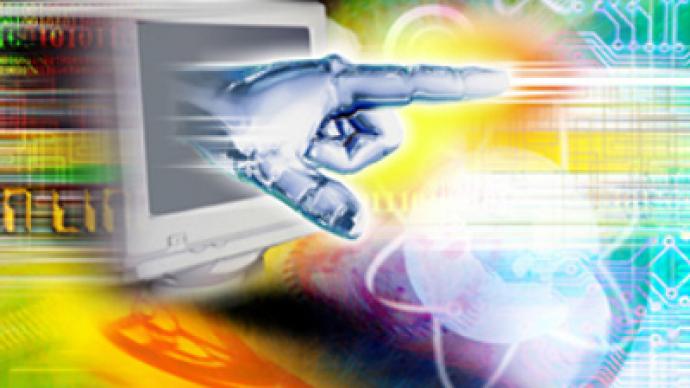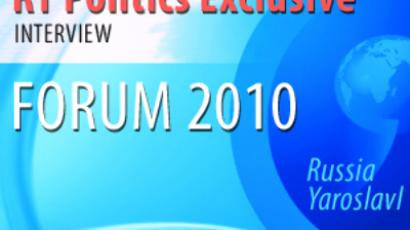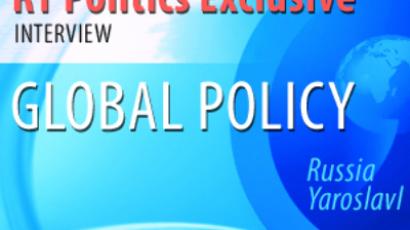World watches Skolkovo

What exactly is the Skolkovo innovation center and why is the world watching it so closely? Anatoly Aleksandrov, one of six co-founders of the center and the rector of Bauman University fills RT in with the details.
The consultative scientific council of the Skolkovo project, a Russian analogue of the Silicon Valley, has officially met for the first time on Friday to determine five guidelines for the innovation center.This week Russia hosts a delegation of venture capitalists from Silicon Valley in the US. The group is headed by the Californian Governor, Arnold Schwarzenegger. The businessmen arrived in Moscow on Monday to take part in the Global Innovation Partnership Forum and to visit the Skolkovo Innovation Center which is being built just outside the capital.
_________________________________________________________Anatoly Aleksandrov- rector of the Bauman Moscow State Technical University (MSTU), a key scientific research resource for the Skolkovo project- director of the MSTU’s pilot-production plant- Doctor of Engineering, professor, on MSTU staff since 1975- author of over 80 scientific publications_________________________________________________________
RT: Why is the Russian President so keen to talk about Skolkovo and why is the Governor of California showing such interest in it?Anatoly Aleksandrov:Skolkovo is being compared to Silicon Valley as the idea behind it is similar to that of Silicon Valley in the US: development and implementation of innovative technologies. We are planning to create a special academic, research, and business environment where scientists can develop, implement, and test-run new technologies. This is a one-of-a-kind project, and the world’s advanced research community is watching it closely. The Bauman MSTU is one of the six co-founders of Skolkovo. We receive a large number of enquiries from researchers all over the world. We have held negotiations with such officials as the Ambassadors of France, Switzerland, and the UK. Recently we had a large delegation from the United States who expressed their interest in cooperation. We do see that the world is interested in the project.Anatoly Aleksandrov, rector of Bauman Moscow State Technical UniversityThis is a presidential project, and it is designed to address Russia’s pressing needs of today. Russia is well-known for its scientific research in many areas, and many achievements of Russian science have received wide international recognition. But what Russia still lacks is an efficient workflow from the idea stage to practical implementation. That’s why we value the experience of our overseas colleagues. Our main focus will be on developing our own best practices in technology implementation. This is why the project has the support of the state – the idea itself was proposed by the state. It also has the support of the Russian business circles. The Skolkovo project’s president is a leading Russian businessman Viktor Vekselberg. The Research Advisory Council is co-chaired by Nobel Prize winners Zhores Alferov [Russian Physicist] Roger Kornberg [American Biochemist]. Twelve leading Russian universities have recently signed the Memorandum of Cooperation with Skolkovo. RT: Everyone knows the fathers of the Moscow State University or the Soviet nuclear program. Who would be Skolkovo’s father?AA: I’ll say it again – this is a presidential project. It is linked to the president’s name. Dmitry Medvedev and his team developed this idea. The project is closely supervised by Vladislav Surkov, the First Deputy Chief of Staff of the Russian President. RT: Why not use existing scientific and research facilities for this project? Russia has dozens of them.AA:We do have many so-called science cities which made their contributions to the country’s development in their time. They are still active projects, and no one doubts their value. But we are planning to create a unique academic, scientific, research, and business environment, and we are planning to fill in the major gap in the workflow our country has – the technology implementation stage. For this purpose, we need a new facility that would be fit enough to help us learn quickly how to commercialize scientific discoveries. We expect Skolkovo graduates to work and apply their skills all over the country.RT: When do you plan to launch the project facility?AA: We expect the construction to be completed in 3 to 4 years. Today, we are pre-screening projects to select the best ones, and we are going to set up umbrella companies for the winners. These companies will enjoy about the same benefits as the Skolkovo project itself. They will develop their projects, and the most successful ones will be moved to Skolkovo once it’s ready.RT: There is a certain belief shared by Russian immigrants abroad that Russia has experienced a major brain drain since the downfall of the Soviet Union – what is your vision from inside a Russian major research institution?AA: There’s a lot of sly and misleading information and numbers about this. No doubt many good researchers left the country during the troublesome ’90s. That’s history, it can’t be helped, but we shouldn’t make a huge problem out of it: many scientists of the old school have stayed here, and many young scientists have grown up since then. Russia’s got the talent. Many of our researchers are acknowledged by the global community, we have a rich academic environment. Nevertheless, we do need to keep learning from our colleagues abroad. We keep working, we make progress, and our achievements are in good demand throughout the world. Times change: many young researchers return to Russia. A former prime-minister of Singapore Lee Kuan Yew once said, “Let your students go abroad, they will always return in the end”.Of course, not everybody will come back, and we won’t take everybody back. Some of my former students are returning – they are now prominent professors at American universities. Here they will teach courses, conduct research, write and publish their works. We see positive processes of academic exchange.Young people in Russia today don’t really want to move abroad permanently, they might consider internships in other counties or short term work. We see this tendency, even though life is still somewhat difficult in our country.RT: What should become the main factor at Skolkovo? Money, people, ideas, bringing in Western specialists?AA:We have the money. We are looking for people – that is the most important thing. We have a long list of “contestants”, so we are choosing. The most difficult thing is to create a market for the ideas and technologies. We don’t have such a market at this point. The best minds in the area of science and management are ready to work with Skolkovo. Leading international companies, including Siemens, Microsoft, Intel are ready to set up research labs at Skolkovo.RT: Most innovations in the world were ordered by defense institutions. How will you solve this problem at Skolkovo, if you are going to invite foreigners there and people with dual citizenship?AA: I don’t think Skolkovo is going to research into military tech. We’ve set out five priority areas of research. Among them are energy conservation technologies including everything from bio-fuel to energy-saving light bulbs. We are also going to research into the energy sphere with an accent on nuclear energy. Then there are satellite technologies (communications and the GLONASS system), medicine (diagnostics systems and new drugs), and the IT sphere, in which we will focus on software and supercomputers.RT: Who decides on the direction of the research?AA:The managing company makes that decision. The Skolkovo Board consists of 12 people, whose names have been disclosed. Two representatives from each founding organization. They don’t all work at these companies, but they are internationally recognized people who represent these companies. There is also an Academic Board, which will make decisions that have to do with the aspect of science. These two boards will determine the direction in which Skolkovo will develop as well as specific forms of development. The main direction was set by President Medvedev.RT: Why would the West want to have this competition in the area of high-tech? How is the West motivated to cooperate here?AA:Isolation times are over. We have nothing to be afraid of. We have enough forces here in the country, enough brains. We have not fully restored the economy yet, but we have enough brains and skills. We are equals with our international partners, in some areas they use our experience. We don’t worship the West, we are not afraid that the West will take advantage of us. Now is the time for cooperation. Of course our Western colleagues know how to lure the best minds. We need to learn how to do this as well.We’re inviting top scientists, those on the world’s top 100 scientists rating, to the Bauman University. We are focusing on renowned scientists such as Boris Zeldovich and Professor Gregor E. Morfill from the Max-Planck-Institut fur extraterrestrische Physik (the Max Planck institute for extra-terrestrial physics) in Garching, Germany. The Bauman institute has nominated several well-known scientists such as Jean-Marie Lehn, a winner of the Nobel Prize in chemistry and his colleague Andre Syrota from Inserm, the French national institute of health and medical research, for seats on the board of Skolkovo’s science council.They gladly agree to work with us, write new courses, conduct research together. We are reorganizing our labs to meet their needs. They are top researchers in their areas of study, and we are glad that they are ready to share their experience with us. I don’t think we lose anything in this cooperation: they take something from us, but we learn a lot from them. In order to have successful cooperation we need to remember the interests of our country, but Russians have always been able to remember their country and learn from others. It is important to keep your dignity, and we have our dignity. We know that we have many good scientists who are known and respected internationally.Skolkovo won’t have “permanent residents”. Those who are successful in their research will continue the work. Those who don’t show any results will have to give their place to more determined researchers. This is a Skolkovo rule.
Nadezhda Kevorkova, RT














